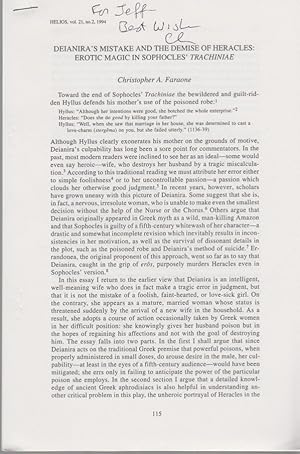About this Item
pp. 115-135. From the library of Prof. Wolfgang Haase, long-time editor of ANRW and the International Journal of the Classical Tradition (IJCT). - With author's dedication to Jeff [Henderson]. - A very good and clean copy. - From the text: Toward the end of Sophocles Trachiniae the bewildered and guilt-ridden Hyllus defends his mother s use of the poisoned robe: Hyllus: "Although her intentions were good, she botched the whole enterprise."- Heracles: "Does she do good by killing your father?" - Hyllus: "Well, when she saw that marriage in her house, she was determined to cast a love-charm (stergêma) on you, but she failed utterly." (1136-39). Although Hyllus clearly exonerates his mother on the grounds of motive, Deianira s culpability has long been a sore point for commentators. In the past, most modern readers were inclined to see her as an ideal some would even say heroic wife, who destroys her husband by a tragic miscalculation. According to this traditional reading we must attribute her error either to simple foolishness or to her uncontrollable passion a passion which clouds her otherwise good judgment. In recent years, however, scholars have grown uneasy with this picture of Deianira. Some suggest that she is, in fact, a nervous, irresolute woman, who is unable to make even the smallest decision without the help of the Nurse or the Chorus. Others argue that Deianira originally appeared in Greek myth as a wild, man-killing Amazon and that Sophocles is guilty of a fifth-century whitewash of her character a drastic and somewhat incomplete revision which inevitably results in inconsistencies in her motivation, as well as the survival of dissonant details in the plot, such as the poisoned robe and Deianira s method of suicide. Errandonea, the original proponent of this approach, went so far as to say that Deianira, caught in the grip of eros, purposely murders Heracles even in Sophocles version. - Wikipedia: Christopher A. Faraone (* 1955) ist ein US-amerikanischer Gräzist. Faraone wurde 1988 an der Universität Stanford zum Ph.D. promoviert und gehört seit 1991 der Fakultät der University of Chicago an, wo er als Frank Curtis Springer and Gertrude Melcher Springer Professor in the Humanities und Professor of classical languages and literature tätig ist. Seine Schwerpunkte sind die archaische und hellenistische griechische Dichtung, die antike Magie und die griechische Religion sowie die orientalischen Einflüsse auf die griechische Kultur. Sprache: Englisch Gewicht in Gramm: 550.
Seller Inventory # 1179742
Contact seller
Report this item

